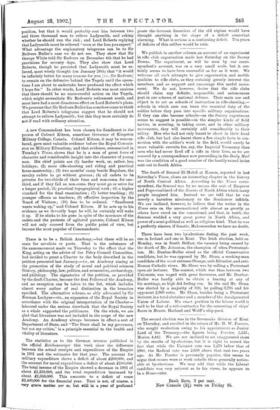There is to be a British Academy,—but there will be
no seats for novelists or poets. That is the substance of the announcement made on Thursday to the effect that the King, acting on the advice of the Privy Council Committee, had decided to grant a Charter to the body described in the petition presented last January,—i.e., an Academy aiming at the promotion of the study of moral and political sciences (history, philosophy, law, politics, and economics), archaeology, and philology. The signatories of the petition, as provided by the draft Charter, become the first Fellows of the Academy, and no exception can be taken to the list, which includes almost every author of real distinction in the branches specified. The alternative scheme, so ably advocated by Sir Norman Lockyer—viz., an expansion of the Royal Society in accordance with the original interpretation of its Charter— laboured under the serious drawback that the Royal Society as a whole supported the petitioners. On the whole, we are glad that literature was not included in the scope of the new Academy. An Academy always becomes in effect a sort of Department of State, and " The State shall be my governors, but not my critics," is a principle essential to the health and vitality of literature.






































 Previous page
Previous page